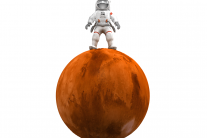Petroleum Engineering Associate Professor leads a research project to study calcium sulfate veins on Gale Crater, Mars
Tue, 05/18/2021 - 8:33amMehdi Mokhtari, Associate Professor of Petroleum Engineering has received a grant entitled Characterizing the Mechanical Properties of Terrestrial Analogs to Calcium Sulfate Veins on Gale Crater, Mars for about $40K. The objective of this project is to study the mechanical properties of analog calcium sulfate veins on the Earth using indirect tensile and fracture toughness tests associated with digital image correlation. The advantage of the digital image correlation technique is to acquire full-field strain data required for complex geometries.
The Mars Science Lab (MSL) Curiosity rover has documented the presence of natural fractures at Gale Crater, Mars. Moreover, the Mars 2020 mission with the Perseverance rover is planned to collect rock and soil samples for a possible return to Earth. The chemical composition of the veins on Mars, studied with the ChemCam instrument, reveals their mineralogy as calcium sulfate but very little is known on the mechanical properties of these veins to further understand how they have been originated. The presence of these calcium sulfate veins has some evidence on the aqueous environment and their occurrence after sedimentation.
The long term vision is to establish a partnership between the University of Louisiana at Lafayette and MSL mission/ Jet Propulsion Laboratory (JPL) to better evaluate the mechanical properties of the Martian surface. Within this collaboration, the UL team will introduce to JPL the capabilities for fracture characterization on shale formations (Mokhtari et al. 2019, Complex Deformation of Naturally Fractured Rocks, Journal of Petroleum Science and Engineering), and the JPL mentor will introduce the current knowledge of natural fractures on Mars. It is the vision of this proposal to set the stage for long-term collaboration between JPL and UL Lafayette to establish a Mars geomechanics laboratory.

